All Ancient Rome models from 3DWarehouse together
-
Ok, this is another model, perfect for friezes of temples, for better realism...
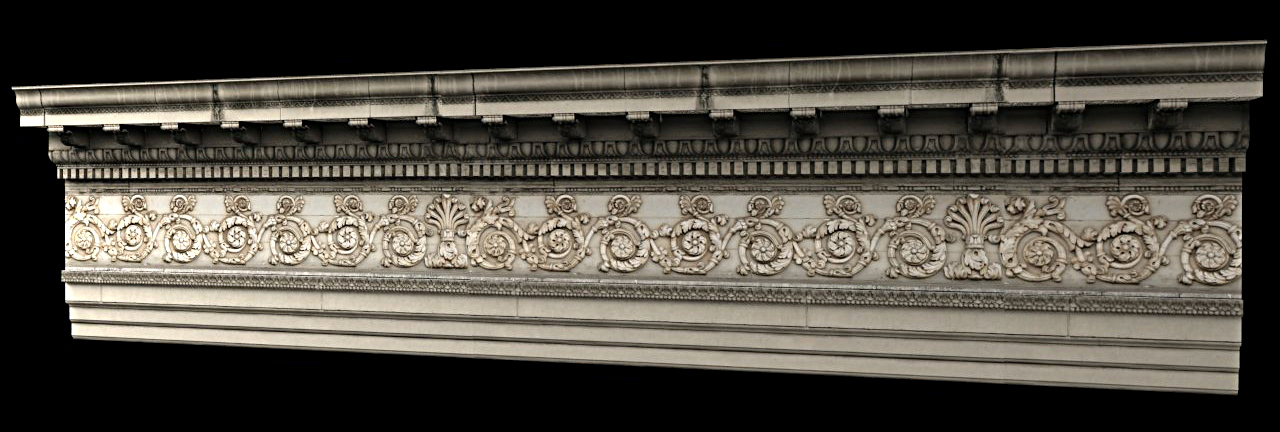
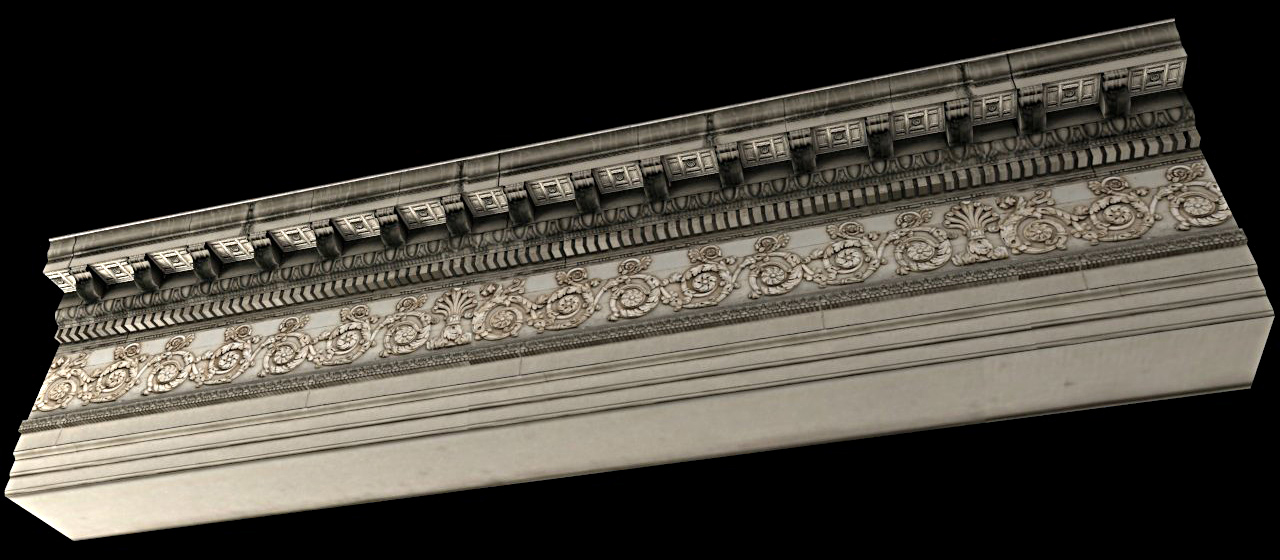
-
rev3rse can you please please please share that great frieze!
tks!!
-
@elysium said:
rev3rse can you please please please share that great frieze!
tks!!
Hi Elysium, you did a similar big work with your models.. I saw some screenshots from your thread of republican forum...
For thr model of frieze, I was improving textures for coffers between the capitals and fixing the tiling for perfect alignment with the centre of symmetry in the frieze (the central palm) and capitals.
This is a little preview with corinthian capitals by fun856 in 3DWH:
File (a little heavy file...) without capitals attached

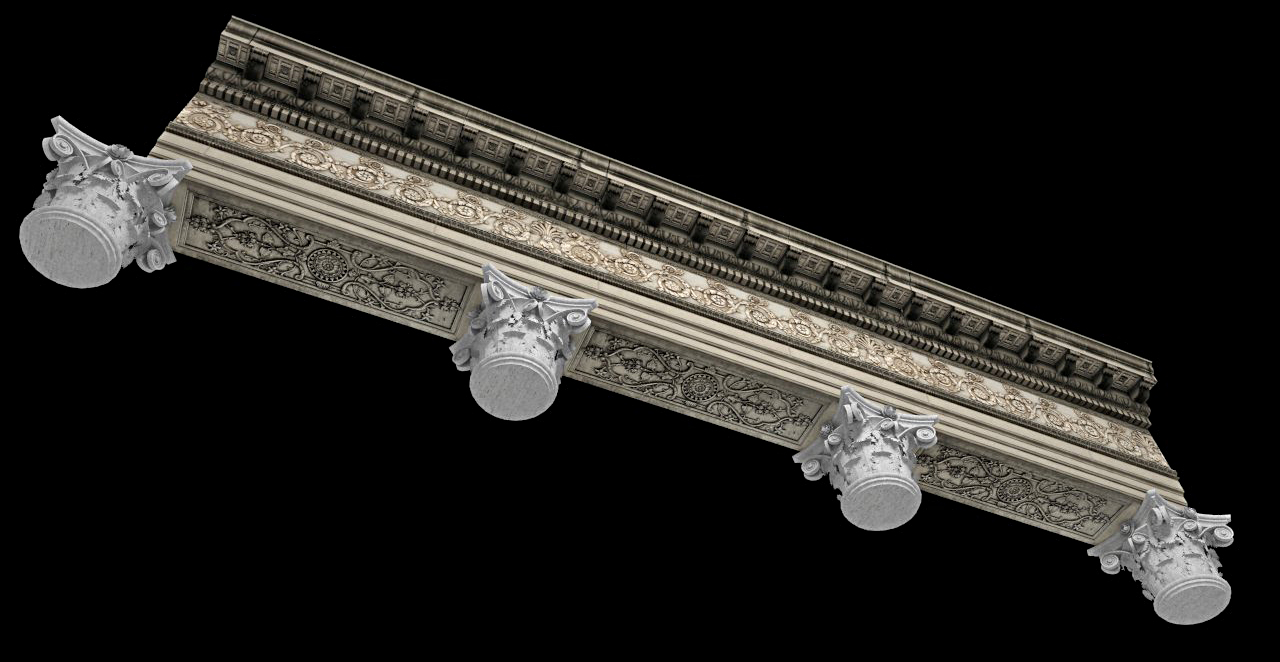
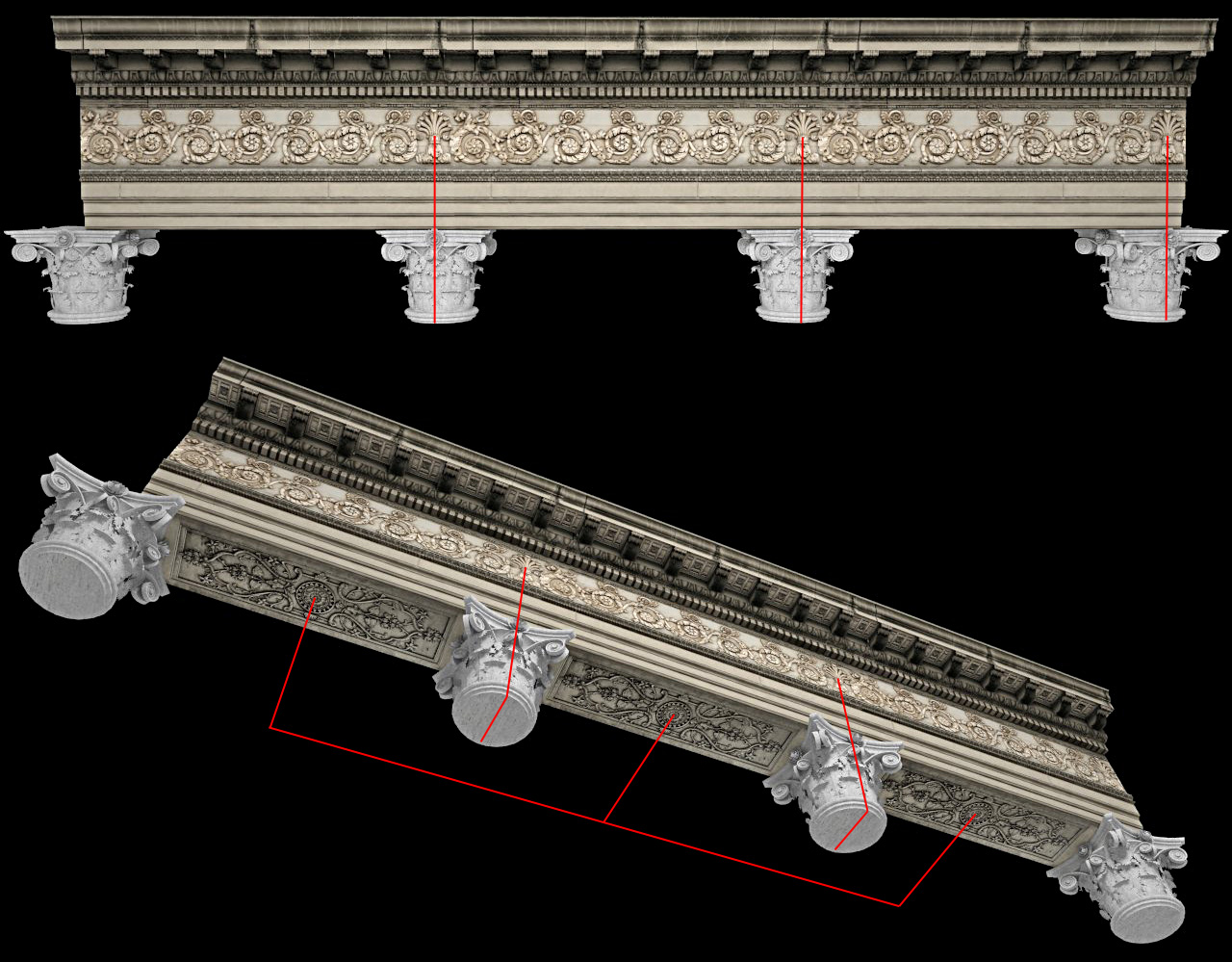
-
I have always thought that Dinamic Components would fit perfectly for the greek and roman ionic, chorintian... columns and friezes. As they had exact proportions and distances according vitrubius it would be easy to make a big building with a dinamic component, automatically repeating the columns with the right distance. You know, in the real word there would be differences respect theory. I don't know if you could adjust it in a dinamic component through a dialog box.
I can't do that, I use the free version of Sketchup (I have never earned money with it). But I give you the idea, if someone wants to do that.
Guide to make Columns (Vignola): http://www.unav.es/ha/009-TRAT/vignola-daviler.htm
-
Tks rev3rse!!
The entablature looks great!!
You can optimise it by lowering the number of lines on the round parts of the cornice and the architrave. The entablature is usually a relatively distant element in a render, so there isn't a need for much detail.
I have a good Corinthian column that might be useful on your model, i made it from bits and pieces that i found on the warehouse, improving them all a little. The column shaft for example is yours. It just needs some texturing.
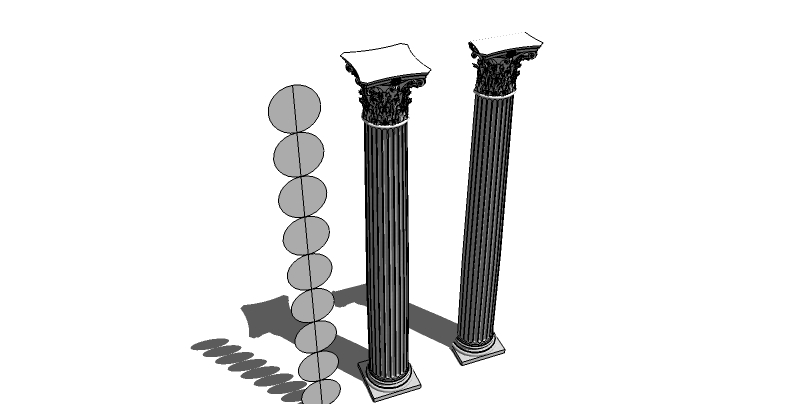
-
pichuneke:
I've thought to DC already, 'cause the length of the frieze and architrave is modular. The problem is the angle, with 4 dedicated different modules, but the construction is really fast.
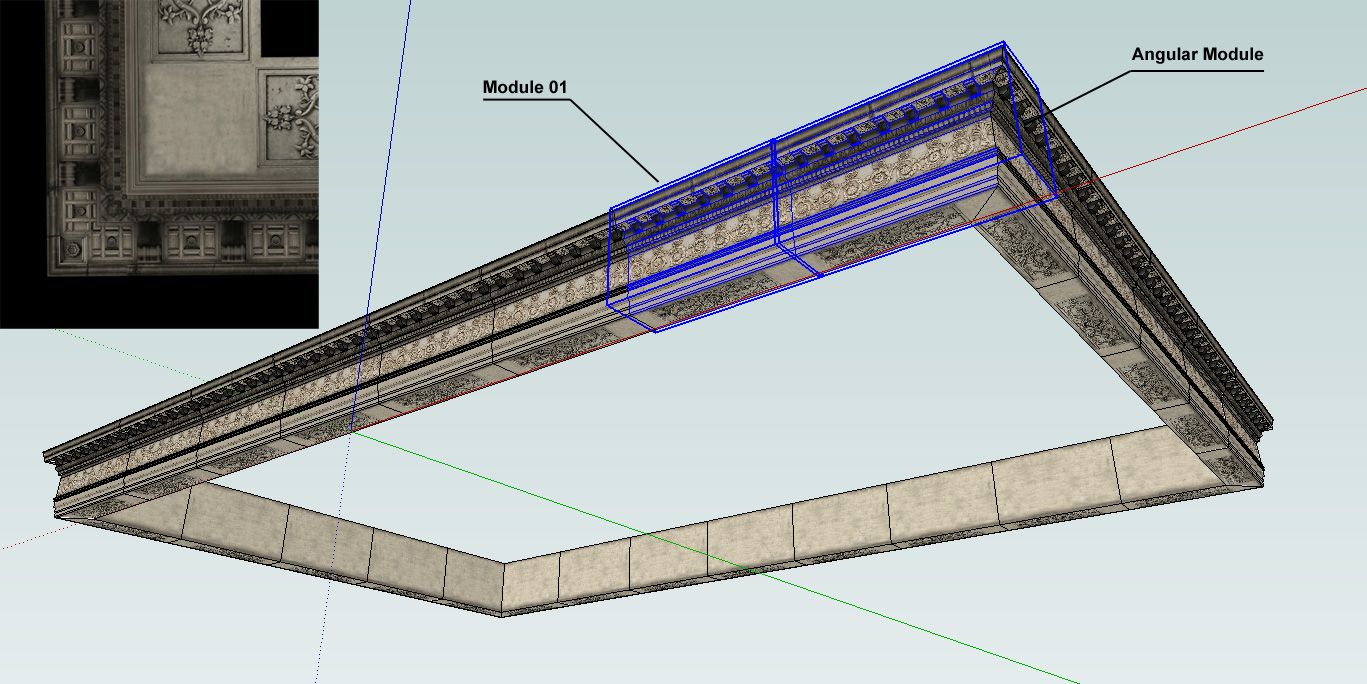
ELYSIUM:
Yes, the rounded mouldings can be simplified in 1 second. For columns, I changed the capital, that in fact it's not of corinthian order, the leaves aren't of acanthus. I maintained the proportions fot the shaft and capital (thanks for using my shaft
 ), it's possible replace that shaft (with a thousand of polys) with a flat shaft, so the model is little and not too complex, especially for time rendering.
), it's possible replace that shaft (with a thousand of polys) with a flat shaft, so the model is little and not too complex, especially for time rendering.This type of entablature is for an eustyle temple, so the columns should be 9,5 diameter height (Vitruvius rules) that I've adjusted...
-
@Danik: Your work is so great and realistic!
So now it is complete. As I have already announced, I would like to 'jump' into these models. But as my screen is too important for doing this, I have to be content with just viewing a panorama.
[flash=500,400:zzav6gdp]http://www.you3dview.com/viewer/viewer.swf?xml=http://www.you3dview.com/flvideo/232/viewer.xml[/flash:zzav6gdp]
-
Aerilius!! It's a wonderful rendering
Only the colossal (really, really colossal) statue of Constantine is missing..
-
You can model the Statue of Constantine with Makehuman:
-
Aerilius
Wonderful rendering of my basilica, despite some textures are missing. It's an excellent idea to represent interiors in this manner. When I'll finish my baths of Caracalla, I'll try to some similar presentations for main interiors.pichuneke
Good proposition, I didn't know about Makehuman... -
I know the coloss. I didn't find a model, I just did the rendering (maybe the situation of about 312, before the statue was finished in 315
 )
)If you need reference for the model, there was already a scientific reconstruction (not freely available
 ) for the Constantine exhibition in Trier ("Treveris"
) for the Constantine exhibition in Trier ("Treveris"  )
)
http://www.arctron.com/3D_Surveying/3D_Laser_Scanning/Examples/Constantine/pictures.php
and this pdf (Danik, also interesting for you):
http://www.arctron.com/3D_Surveying/3D_Laser_Scanning/Examples/Constantine/PresseArcTron3D.pdfhttp://www.romereborn.virginia.edu/gallery.php#images_2_0
Have fun!
-
This is a great thread, a




 to all of you.
to all of you. -
Hi
I made in my models the total update, hard work, took a few days

I have changed everything textures. Many thanks to rev3rse again for the texture link
I ask all, download my models again
-
Hello,
I'm French and i studiying roman architecture since several months.
First, i congratulate you for your wonderful models !I am fascinated by old architecture and I have already made a model of architectural complex of Pharaoh Sahure to Abusir. I also started to model Persepolis since winter 2008 but never finish.
Here are some pictures of my work :



Your models are very interesting but do not have the right proportions. I have studied many texts and also Vitruvius. His formulas do not work for all but we can get some interesting values such as intercolumniation or height of columns depending on the type of building.
I set some rules for obtain a building with harmonious proportions. This one tries with the Temple of Vespasian :

You must first determine the proportions of columns and entablature.
The entablature of Vitruvius is not appropriate for a Roman temple. However, you can follow his instructions for the Corinthian column.For the entablature, I advise you to refer to the Corinthian order of Vignola.
I do not find attractive method for determining the angle of the pediment or values stylobate and stairs.Next, you must consider the values between the columns proposed by Vitruvius and height of columns that refers to each of them.

-
Hi Z-Akh and welcome with these nice models!
As for Vitruvius, I find that his proportions are often just an idealised "average" of what should be built but individual buildings (especially in the provinces) are only more or less following those "ideas" rather tan strictly following them as true canons (and then there is also the time span of several hundred years during which many things changed).
Nevertheless, theoretically speaking, SketchUp is indeed an ideal tool to study these canons and see how they would work in practice.
-
I agree with Gaieus.
Forget about Vitruvius!! lolol the ten books are greatly overrated.

Its a great source for understanding ideal roman architecture, but it has a lot of trouble when applied to real life and real buildings
The books are really poorly written, Greek mixed with Latin, invented words, missing parts, no mention of engaged columns and orders..... some buildings described are impossible to build because he sets contradictory rules and proportions, the list of mistakes goes on and on...,
And like Gaieus pointed out the books were written in the start of Augustus reign, the empire lasted for 400 years after that!Its really hard to find a roman building that fits in Vitruvius understanding of rules and proportions. Like for example the Panteon! does it fit Vitruvius? no way...
The Ten Books are just a set of principles for ideal architecture, don´t try and fit everything in it.
Post Scriptum: Great images, can you show us more???
-
I agree with you. Vitruvius should be used to understand some basic principles.
For example, for values of intercolumniation: Vitruvius gives us values such as 1.5 d (diameter) for Pycnostyle or 2 d for Systyle.
The architect is free to choose the value which is more harmonious. It can also make an average. This applies to the "square house" of the city of Nimes in France : The values of intercolumniation is an average between Pycnostyle and Systyle.
For column, I am guided by Vitruvius because Vignola's corinthian column seems disproportionate.
The capital is too high and the base too narrow. The height proposed by Vignola is also too high. (Vitruvius also said that for Pycnostyle the height of the column should be 10 d, it is also impossible).I'll post more images later.

-
I tried to render L.VII.C's model with Twilight render.
Even without good proportions, is already beautiful!




-
Hi Z-Akh69
Your models are great
 . It would be interesting to examine them in 3D mode.
. It would be interesting to examine them in 3D mode.
Thank you very much for rendering my forum. So it looks better than it is really
-
great render!
(@L.VII.C:) The light blots on the base of the column and below the statue on the left could be caused by either totally white (rgb=255,255,255) or untextured faces. Also make sure that the faces show the frontface (in monochrome face style, the blueish color means the backface and white means frontface). I also struggled with this in one of my monastery renders but I'm sure it can be solved .
.I keep my eyes open, because the last thing we need are people. Plebeians and patricians, Cicero and senators... Maybe there are some good movies in tv these days, where I can catch some people...
Advertisement







